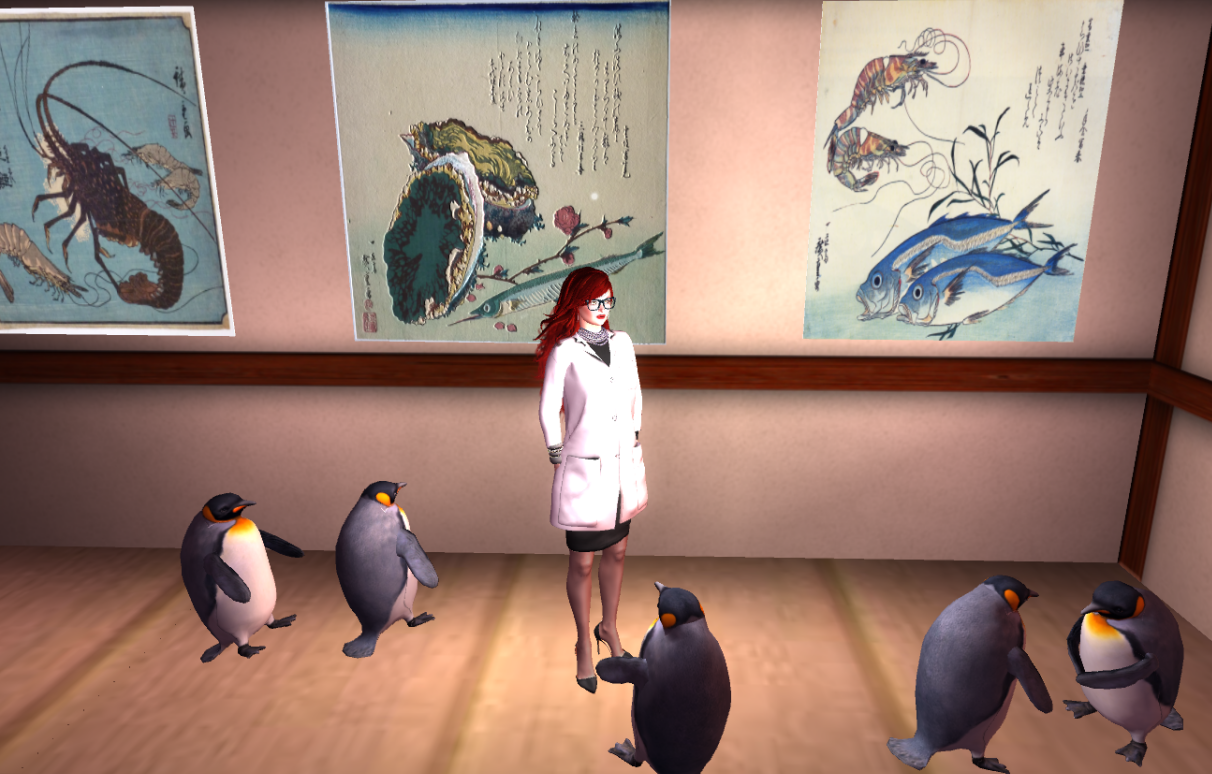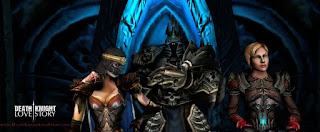Tips & Tricks for negotiating The Metaverse with.....Pooky Amsterdam
In May of 2014, I had the pleasure to interview Hugh Hancock who had a great influence in Metaverse Entertainment & Game Engine film. Hugh originated the term Machinima, which means cinema done on machine. We have come a long way since then.
The MTV Movie Awards just had their first Metaverse category. While many Metaverses have not only their own film tutorials, but tremendous content, it is well worth a look back at this exciting field! (MacInnes Studio has open today the new Real-Time Movie challenge which uses a game engine for filmmaking.)
Recently I ran across this interview and for his work on the virtual plane I am reproducing it now, as his work on this earthly one is finished. In reading this again 8 years after, Hugh predicted Meta from Facebook and much more! A real futurist!
Using game engines for filmmaking has grown tremendously over the years, this is worth a read for both content and context.
Here's to you Mr. Hancock, wherever you are!!
Q & A with Hugh Hancock
-----------------------------------------------------------------------------------------------------------------------------
From the mind of the Machinima Man himself: HUGH HANCOCK
What happens when a portmanteau you are credited with becomes the next step in indie animation? You become quite recognized for your contribution to the medium and much more. Leading the way for so many of us in his field is Hugh Hancock of Stange Company, someone who has never taken his eyes off the future or the present possibilities with this game engine medium. I was lucky enough to catch him after he finished Part 1 of his epic new achievement: Death Knight Love Story. Here are some wonderful and, of course, incredibly insightful answers to the questions that Machinima minds and virtual world production people want to know!
Q: You go way back in Machinima as an entertainment and art form. When you started in 1997, did you see some of what the future would hold? Or were you at the time simply very excited to have this original outlet for your deep creativity?
HH: It's been a fascinating journey since that time!
Honestly, false modesty aside, I'd say that a lot of how Machinima has developed has been true to the version of it that Gordon McDonald, I and other Machinima pioneers had way back when it started out. A lot of things, including intellectual property issues, have conspired to mean that Machinima's development has in some ways been slower than we expected, with pioneering projects hitting unexpected roadblocks. However, with every year that passes, Machinima and similar techniques are coming closer to fulfilling the core dream of film as a truly democratic art form, rather than one whose scope is primarily dictated by available budget.
Q: At what point did you see the crossover from playing games in real time to capturing game engine film in real time?
HH: I must confess I didn't understand the potential of virtual worlds as a film-making tool until it was demonstrated by the Quake Movies, however, once I saw them and once I started with them myself, it was immediately obvious just how much potential this new approach to filmmaking had.
In retrospect, it's pretty obvious - games are world and action creation tools, and evoking a world is one of the hardest and most expensive parts of filmmaking. A tool that creates virtual worlds is incredibly powerful - and more importantly, incredibly freeing - for any filmmaker.
Q: Your recent film Death Knight Love Story is clearly a breakthrough in many ways. How difficult or easy was it to get people like Joanna Lumley and Brian Blessed on board?
HH: I was actually surprised at how open and interested both our casting director, Gail Stevens, and our stars were to this weird computer game-based project! Joanna put it best I think: "As an actor, you have to stay in the boat."
With the entire world of show business changing so fast right now, it makes sense that the people at the top of the industry are more, not less interested than most in exploring new ideas!
Having said that, none of this would have happened if I hadn't decided to contact people who I thought would be far too busy to be interested in a strange little machinima film. That's something I'd like to see more of in the virtual world and machinima communities - reaching out to people who would be interested in collaborating, featuring, or investigating our projects.
Q: Why did you chose World of Warcraft as your game engine choice for DKLS?
HH: I've played WoW for years, and have a deep fondness for the background and story of the world of Azeroth. It's a wonderful backdrop for all sorts of stories, as other Machinima creators before me have shown. In addition the fact that Blizzard were one of the first companies to put out a public Machinima license meant that I was very interested in supporting them in that, and seeing what could be done in the world of WoW.
The fact that the license existed was also a major plus point for me, as the legal uncertainties of other Machinima projects in other games have become a bit wearing in the past! It was nice to know where we stood with regards to the intellectual property we were building upon (at least until some last-minute unexpected changes to Blizzard's license!)
Q: What were some of the biggest challenges in using Wow? And successes?
HH: The success of using WoW was definitely the sheer scope it afforded us. Over the years, Azeroth has grown to be such a massive "backlot" from a movie-maker's point of view that we hardly ever failed to find a location that was perfect for the scene, or a prop or character who would fit into the story.
The fact that most of the team working on DKLS were also familiar with WoW was a big help too - that intimate familiarity meant we could immediately identify parts of the world which would work for the story we wanted to tell, and it saved us a lot of time location scouting.
The main challenges of the project were definitely pushing WoW to do something that it doesn't normally do. Death Knight Love Story turned out to be a quite subtext-heavy, very understated story that demanded a wide range of emotion from our characters, and the Wow graphics are very bold and brash - they aren't exactly known for their subtle expressiveness.
As a result, we ended up commissioning quite a bit of custom art for our lead characters, and fitting that into the overall WoW world and art style was a challenge, and possibly one we didn't fully meet.
Q: What virtual worlds, if any, do you have a personal avatar presence in? Why/Why not...please comment. When you are not filmmaking, are there any other activities you enjoy?
HH: I've got a presence in Second Life, but not a very active one. By preference my usual virtual community hangouts are very old-school and textural - Hacker News and Reddit, primarily!
In terms of non-filmmaking interests, I've had a lifelong interest in martial arts and I'm currently just starting to study Krav Maga, the Israeli self-defense technique. Real-life martial arts have always felt surprisingly similar to virtual world gaming to me - the extreme twitch reactions and spatial awareness of games like Quake are very similar to offline sparring.
I'm also a keen cook- hence my cookery show, Kamikaze Cookery - as well as a coffee and food enthusiast. And I still play offline, pen & paper roleplaying games as well as conventional computer games. Currently I'm playing through The Witcher 2, which I'm finding a very enjoyable story experience!
Q: Do you think virtual worlds and/or synthetic environments are a legitimate place for the co-opting of more traditional forms of entertainment? Such as a talk or a game show?
HH: I think that This Spartan Life has already well and truly proved that a virtual world talk show can work very well indeed! And of course, the huge rise in e-sports are as watchable and enjoyable as physical-equivalent sports. With the rise of virtual reality in particular, I think we will be seeing more and more physical world entertainment move to the virtual world.
Q: Many of the shows which are created in VWTV are often an offshoot of what we already participate in (with some stunning exceptions such as The Giant Snail races). Do you think people are limited by their actual experiences, or why do you think that folks with the ability to create "anything" often chose what is familiar?
HH: Innovation is often overrated, at least in terms of creating content which will attract an audience. people tend to like things that are similar to other things they've already enjoyed. We can see that on TV, with the endless police procedurals and medical dramas, and the same applies just as much to virtual entertainment.
Having said that, the shows that become massive hits are usually innovators in some way. I'm not surprised that most virtual world shows are similar to existing media, but I'd expect the breakout ones to be startlingly different.
Q: What are your thoughts on new interfaces like the Oculus Rift in virtual worlds?
HH: Well, the recent acquisition of the Oculus Rift by Facebook pretty much confirms that we're going to see a metaverse-like virtual world within virtual reality very soon. Mark Zuckerberg's making a big play here, and I don't think anyone who has thought about the situation really believes he just intends to put Facebook ads on an Oculus Rift - he's making a play for the next big frontier of technology, and it's very credible to believe that's going ot be VR.
https://www.youtube.com/watch?v=WUSn6Oee5D4&t=6s
(The above links to Hugh doing a Riftjam Game Demo Video: Eye Of The Tower)
VR still isn't 100% proven. There are serious challenges facing people - including me- who are pioneering VR experiences, from "VR Sickness" to having to design an entirely new user interface. But the potential of VR is completely unmatched right now. if anything's going to bring virtual worlds into the mainstream, it's being able to step into them completely through a VR headset.
And it seems Mr. Zuckerberg thinks the same....
Q: Could you see doing a weekly show broadcast from a virtual world? And if so, what kind of show would you like to see or be part of?
HH: Absolutely-there's no reason to believe that's not entirely possible. i have long held backburner ideas for a political satire show made in virtual space, as it happens - a successor of sorts to the UK's infamous puppet satire show Spitting Image. I'm honestly surprised that no-one I'm aware of has tried political satire in virtual film yet!
Q: What are the biggest challenges you are finding with audiences who aren't familiar with WoW or Virtual environments in screening DKLS? Are you finding any resistance to the look and feel?
HH: Interestingly, most of the resistance we've faced from viewers of DKLS has come from people who *are* familiar with wow! Because we stepped away from the conventional aesthetic of WoW to create higher-resolution characters, that seem to be quite a jarring experience for people familiar with WoW.
In addition, we faced "Uncanny Valley" problems with DKLS's much higher visual fidelity than previous projects we've worked on. Figuring out a way round or over the infamous Uncanny Valley is pretty much my top priority right now.
Q: Anything more you would like to add? Free space!
HH: The next few years are going to be truly fascinating for people who are interested in virtual worlds. What has for along time been a niche interest appears to be going mainstream, fast!!
----------------------------------------------------------------------------------------------------------------------------
If you wish to read the interview on the Virtual Worlds Television blog, please click here, and feel free to explore past interviews.
If you have a question please email info@pookymedia.com with Metaquette in the Subject, and it will be answered.









